初中七年级下学期的英语教案
- 格式:docx
- 大小:19.99 KB
- 文档页数:17
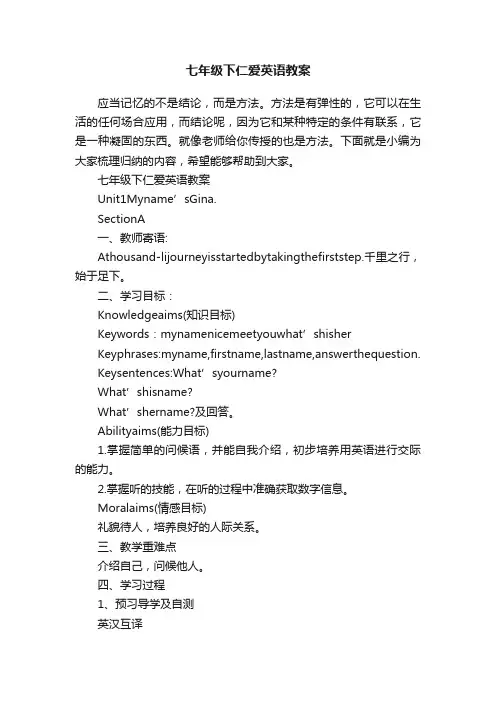
七年级下仁爱英语教案应当记忆的不是结论,而是方法。
方法是有弹性的,它可以在生活的任何场合应用,而结论呢,因为它和某种特定的条件有联系,它是一种凝固的东西。
就像老师给你传授的也是方法。
下面就是小编为大家梳理归纳的内容,希望能够帮助到大家。
七年级下仁爱英语教案Unit1Myname’sGina.SectionA一、教师寄语:Athousand-lijourneyisstartedbytakingthefirststep.千里之行,始于足下。
二、学习目标:Knowledgeaims(知识目标)Keywords:mynamenicemeetyouwhat’shisherKeyphrases:myname,firstname,lastname,answerthequestion.Keysentences:What’syourname?What’shisname?What’shername?及回答。
Abilityaims(能力目标)1.掌握简单的问候语,并能自我介绍,初步培养用英语进行交际的能力。
2.掌握听的技能,在听的过程中准确获取数字信息。
Moralaims(情感目标)礼貌待人,培养良好的人际关系。
三、教学重难点介绍自己,问候他人。
四、学习过程1、预习导学及自测英汉互译_________2.好的,令人愉快的______________3.too___________4.遇见______5.your____________6.his_________7.她的名字______2、自主学习①.onenum.1,一:Oneandtwomakesthree.一加二等于三。
adj.①一个:Ihaveonebook.我有一本书。
②有一(天):Onedayhewillunderstandyou.有一天他会理解你的。
②meet/mi:t/v.遇到,碰到【记忆法】-ee-双写,与meat为同音词。
【考点】tomeetsb.(orsth.)遇到某人/某事:Nicetomeetyou.初次见面时的客套话,不是初次见面时则用see。
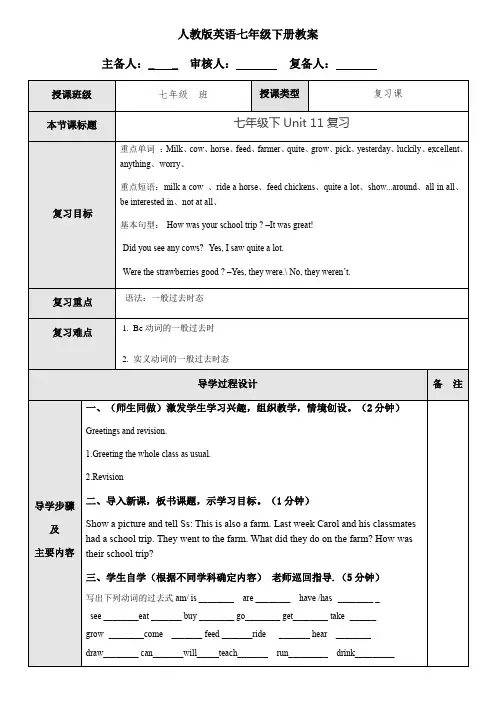
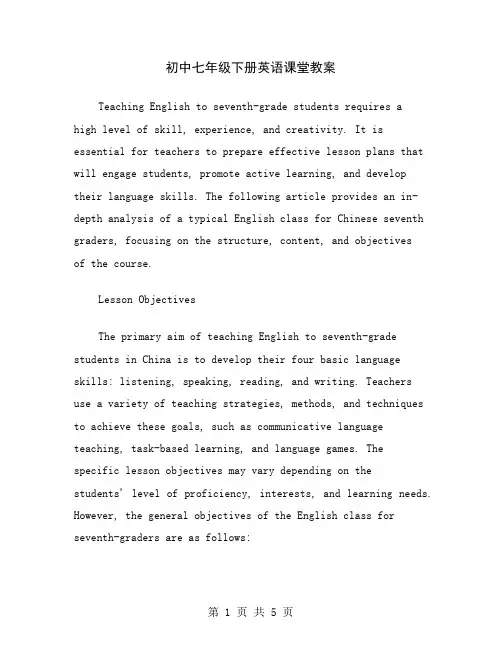
初中七年级下册英语课堂教案Teaching English to seventh-grade students requires ahigh level of skill, experience, and creativity. It is essential for teachers to prepare effective lesson plans that will engage students, promote active learning, and developtheir language skills. The following article provides an in-depth analysis of a typical English class for Chinese seventh graders, focusing on the structure, content, and objectivesof the course.Lesson ObjectivesThe primary aim of teaching English to seventh-grade students in China is to develop their four basic language skills: listening, speaking, reading, and writing. Teachers use a variety of teaching strategies, methods, and techniques to achieve these goals, such as communicative language teaching, task-based learning, and language games. Thespecific lesson objectives may vary depending on thestudents' level of proficiency, interests, and learning needs. However, the general objectives of the English class for seventh-graders are as follows:1.To develop students' listening and speaking skillsby providing meaningful and relevant input throughaudiovisual materials, dialogues, and role-playingactivities.2.To enhance students' reading comprehension skillsby selecting authentic and diverse reading materials that are appropriate for their age and level of proficiency.3.To improve students' writing skills by providingthem with opportunities to write short paragraphs, essays, and journals on various topics and using different writing styles.4.To expand students' vocabulary and grammarknowledge by introducing new words, idioms, expressions, and structures in context and through explicit instruction.Lesson StructureA typical English class for seventh-graders in China consists of four parts: warm-up, presentation, practice, and production. The duration of each part may vary depending on the lesson objectives and the teacher's preferences. However, the general structure of the class is as follows:1.Warm-up (5-10 minutes)The warm-up phase is designed to prepare students for the lesson and to activate their prior knowledge and interest in the topic. It can take different forms, such as a quick quiz, a brainstorming session, a review of previous lessons, or a short game related to the topic. The aim is to provoke curiosity, encourage participation, and create a positive learning atmosphere.2.Presentation (20-30 minutes)The presentation phase involves introducing the new language items, concepts, or skills to the students in aclear and attractive way. The teacher may use various media, such as pictures, videos, songs, or stories, to illustrate and explain the target language. The aim is to facilitate comprehension, memory retention, and motivation.3.Practice (20-30 minutes)The practice phase involves engaging students in interactive, communicative, and meaningful activities that enable them to use and apply the target language in a controlled and guided way. The activities may include drills,pair work, group work, games, or simulations, depending on the lesson objectives and the students' learning needs. The aim is to provide ample opportunities for students to experiment with the language, receive feedback, and overcome their difficulties.4.Production (10-15 minutes)The production phase involves giving students the chance to use the target language creatively, flexibly, and independently in a task or project that is relevant to their interests and goals. The tasks or projects can be oral, written, or multimodal, and they may involve individual or collaborative work. The aim is to promote autonomy, creativity, and self-evaluation.ConclusionTeaching English to seventh-grade students in China is a challenging but rewarding task that requires a deep understanding of the learners' needs, interests, andcognitive development. The lesson plans should be designed to address the four basic language skills in a holistic and integrated way, using a variety of teaching strategies, methods, and techniques. The structure of the class should beflexible, interactive, and dynamic, and the teacher should act as a facilitator and a motivator, rather than a lecturer or a drill sergeant. By following these principles, English teachers can help their students to become confident, competent, and communicative users of English.。
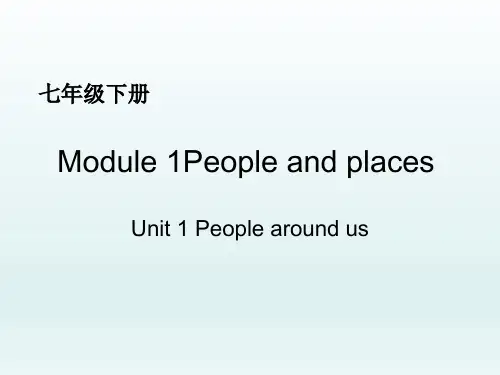
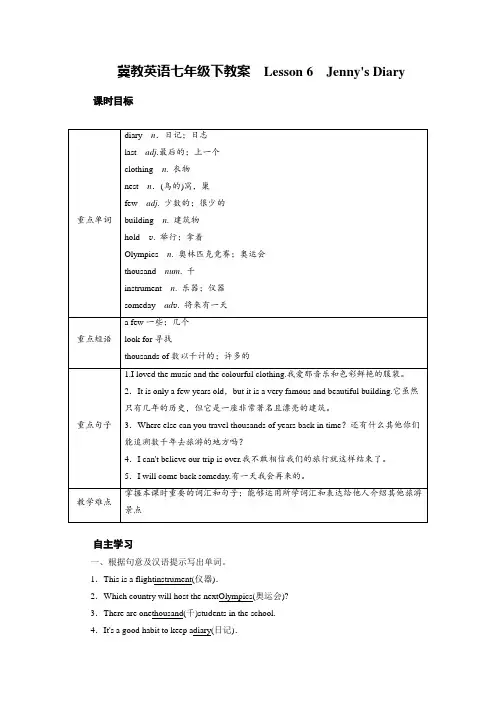
冀教英语七年级下教案Lesson 6Jenny's Diary 课时目标自主学习一、根据句意及汉语提示写出单词。
1.This is a flightinstrument(仪器).2.Which country will host the nextOlympics(奥运会)?3.There are onethousand(千)students in the school.4.It's a good habit to keep adiary(日记).5.I believe that my dream will come truesomeday(将来有一天).二、写出下列画线短语的汉语意思。
1.It is only a few years old,but it is a very famous and beautiful building.一些;几个2.Danny looked for birds there.寻找3.Where else can you travel thousands of years back in time? 数以千计的;许多的教学过程环节1新课导入T:Look at the picture.I'm sure you all know that it is the Tian'anmen Square in Beijing.Today we will follow Jenny to have a look at some Beijing's famous places.设计意图:展示与课文相关的图片,不仅可以吸引学生的注意力,还能激发学生的求知欲望,同时为接下来的学习作好铺垫。
环节2新课学习1.教师让学生快速浏览教材第12页的Jenny的日记,了解其主旨大意。
2.教师让学生仔细阅读詹妮的日记,勾画出文中的重难点短语和句子,随后教师进行一一讲解。
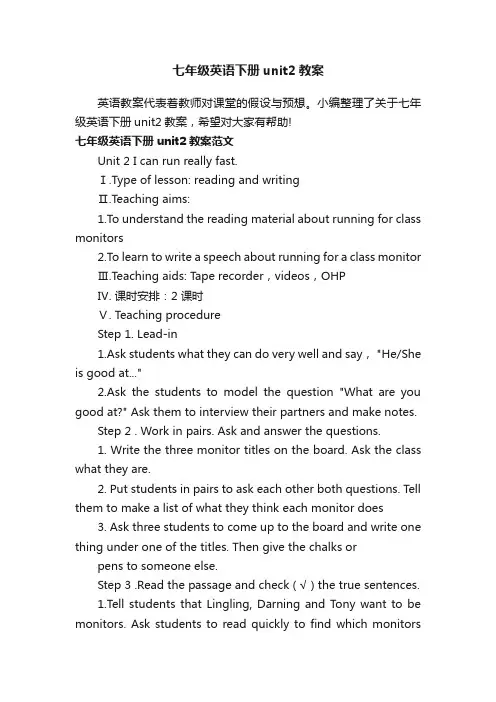
七年级英语下册unit2教案英语教案代表着教师对课堂的假设与预想。
小编整理了关于七年级英语下册unit2教案,希望对大家有帮助!七年级英语下册unit2教案范文Unit 2 I can run really fast.Ⅰ.Type of lesson: reading and writingⅡ.Teaching aims:1.To understand the reading material about running for class monitors2.To learn to write a speech about running for a class monitorⅢ.Teaching aids: T ape recorder,videos,OHPⅣ. 课时安排:2 课时Ⅴ. Teaching procedureStep 1. Lead-in1.Ask students what they can do very well and say, "He/She is good at..."2.Ask the students to model the question "What are you good at?" Ask them to interview their partners and make notes.Step 2 . Work in pairs. Ask and answer the questions.1. Write the three monitor titles on the board. Ask the class what they are.2. Put students in pairs to ask each other both questions. Tell them to make a list of what they think each monitor does3. Ask three students to come up to the board and write one thing under one of the titles. Then give the chalks or pens to someone else.Step 3 .Read the passage and check ( √ ) the true sentences.1.Tell students that Lingling, Darning and Tony want to be monitors. Ask students to read quickly to find which monitorsthey want to be.2. Ask students to read again. This time they can use their fingers to skim through and underline the things Lingling,Darning and Tony are good at.3. Ask students to check in pairs and elicit answers from the whole class.4. Ask students to read the sentences on page 11, and talk about them in pairs and guess the answers.5. Ask students to read the passage again and decide if the sentences are true or false. If false,then say why.6. Ask students to check with their partners.If their answers are different,tell them to go back to the text,read again and check.7.Ask students to read out the sentences and say if they are true or not. If not ,ask them to say why.Step 4 Underline the correct words.1. Ask students to work in pairs. Tell them to read through the passage and choose the correct words.2. Check answers by reading the passage aloud and pausing to allow the whole classto complete it with the correct words.Step 5 Complete the sentences with the correct form of the expressions from the box.1. Ask students to look at the expressions in the box.2. Ask students complete the sentences on their own and be careful with the language forms.3. Check in pairs. Elicit answers from the whole class in full sentences.Step 6 Work in pairs. Choose the best people in your class to be the monitors in Activity 1.Say: who they are and what job they can do and why they can do it1. Write titles of the three monitors across the board.2. Ask the class for two volunteers for each monitor. Write their names underneath.3. Put volunteers in pairs to talk about what they are good at, can do well and how they can help.4. Ask the rest of the students to make a table as below with three questions about their abilities to ask the volunteers. Put it on the board.Questions Student 1 Student 2 Student 3 Student 4 Student 5 Student 6Good at?Can do?Can help?5.Tell students to talk in groups about their notes,and decide who should be their monitors and say why.Step 7 Homework1. Remember the new words and expressions in Unit2.2 . Write a passage about one of the monitors in Activity 5.Ⅵ Blackboard showingⅦ Self-reflection.英语教学非智力因素探讨1.中学英语教学中非智力因素发展现状1.1中学生普遍缺乏真正的学习动机学习动机和学习兴趣是学生非智力因素中非常重要的一部分,兴趣是最好的教师,只有学生能够真正对英语感兴趣,才能让学生产生对英语的内在需求,才能真正激发他们的非智力因素。
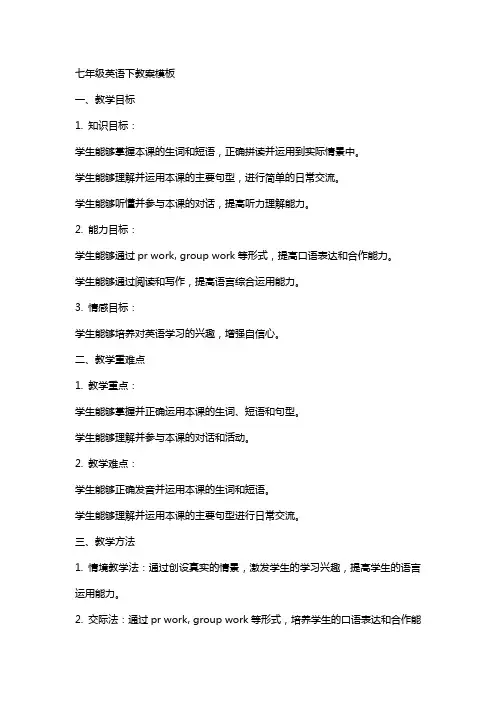
七年级英语下教案模板一、教学目标1. 知识目标:学生能够掌握本课的生词和短语,正确拼读并运用到实际情景中。
学生能够理解并运用本课的主要句型,进行简单的日常交流。
学生能够听懂并参与本课的对话,提高听力理解能力。
2. 能力目标:学生能够通过pr work, group work等形式,提高口语表达和合作能力。
学生能够通过阅读和写作,提高语言综合运用能力。
3. 情感目标:学生能够培养对英语学习的兴趣,增强自信心。
二、教学重难点1. 教学重点:学生能够掌握并正确运用本课的生词、短语和句型。
学生能够理解并参与本课的对话和活动。
2. 教学难点:学生能够正确发音并运用本课的生词和短语。
学生能够理解并运用本课的主要句型进行日常交流。
三、教学方法1. 情境教学法:通过创设真实的情景,激发学生的学习兴趣,提高学生的语言运用能力。
2. 交际法:通过pr work, group work等形式,培养学生的口语表达和合作能力。
3. 任务型教学法:通过完成具体任务,提高学生的综合语言运用能力。
四、教学过程1. 导入:通过歌曲、游戏等方式,激发学生的学习兴趣,引入本课主题。
2. 呈现:通过图片、实物等,展示本课的生词和短语,引导学生进行观察和思考。
3. 练习:通过pr work, group work等形式,让学生实际运用本课的生词、短语和句型进行交流。
4. 对话:通过播放录音或角色扮演,让学生听懂并参与本课的对话,提高听力理解能力。
5. 阅读:通过阅读教材或相关材料,培养学生的阅读能力和理解能力。
6. 写作:通过写作练习,提高学生的写作能力和语言综合运用能力。
8. 作业布置:布置相关作业,巩固所学内容。
五、教学反思在课后,教师应认真反思本节课的教学效果,包括学生的学习兴趣、参与度、语言运用能力等方面。
教师也应对学生的学习情况进行跟踪和评估,及时发现并解决问题,提高教学质量。
六、教学评价1. 课堂表现评价:观察学生在课堂上的参与程度、合作能力和语言运用能力。
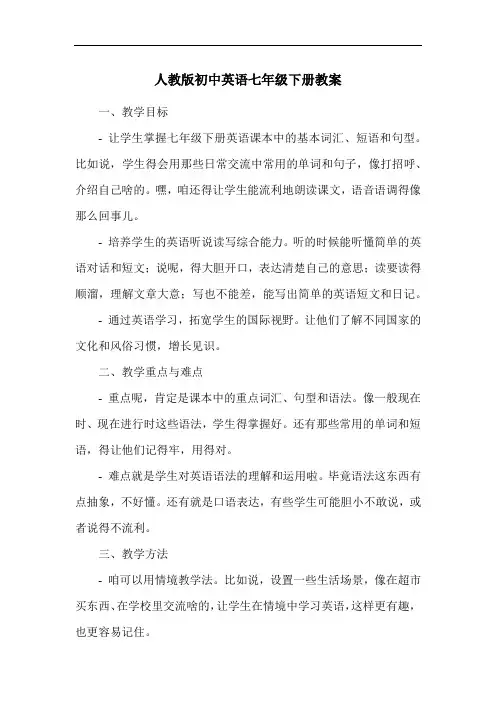
人教版初中英语七年级下册教案一、教学目标- 让学生掌握七年级下册英语课本中的基本词汇、短语和句型。
比如说,学生得会用那些日常交流中常用的单词和句子,像打招呼、介绍自己啥的。
嘿,咱还得让学生能流利地朗读课文,语音语调得像那么回事儿。
- 培养学生的英语听说读写综合能力。
听的时候能听懂简单的英语对话和短文;说呢,得大胆开口,表达清楚自己的意思;读要读得顺溜,理解文章大意;写也不能差,能写出简单的英语短文和日记。
- 通过英语学习,拓宽学生的国际视野。
让他们了解不同国家的文化和风俗习惯,增长见识。
二、教学重点与难点- 重点呢,肯定是课本中的重点词汇、句型和语法。
像一般现在时、现在进行时这些语法,学生得掌握好。
还有那些常用的单词和短语,得让他们记得牢,用得对。
- 难点就是学生对英语语法的理解和运用啦。
毕竟语法这东西有点抽象,不好懂。
还有就是口语表达,有些学生可能胆小不敢说,或者说得不流利。
三、教学方法- 咱可以用情境教学法。
比如说,设置一些生活场景,像在超市买东西、在学校里交流啥的,让学生在情境中学习英语,这样更有趣,也更容易记住。
- 游戏教学法也不错。
比如单词接龙、英语猜谜游戏,让学生在玩的过程中学习英语,提高他们的积极性。
- 还可以用多媒体教学法。
放一些英语电影、歌曲啥的,让学生感受英语的魅力。
四、教学过程(一)精彩导入上课铃响了,同学们都陆陆续续回到座位上。
老师微笑着走进教室,神秘地说:“同学们,今天咱们先来听一首好听的英文歌怎么样?”同学们一听,都兴奋起来,纷纷点头说好。
老师打开多媒体设备,播放了一首节奏欢快的英文歌曲《Big Big World》。
歌曲播放完后,老师问同学们:“这首歌好听吗?大家有没有注意到歌里的一些英文单词呀?”同学们七嘴八舌地回答着,有的说听到了“world”,有的说听到了“big”。
老师笑着说:“对呀,今天咱们就来学习一些新的英语单词和语法,就像这首歌里的一样有趣哦。
”(二)趣味知识讲解1. 背景介绍老师拿出一张世界地图,指着地图说:“同学们,我们生活在一个大大的世界里,英语就是我们和世界交流的工具。
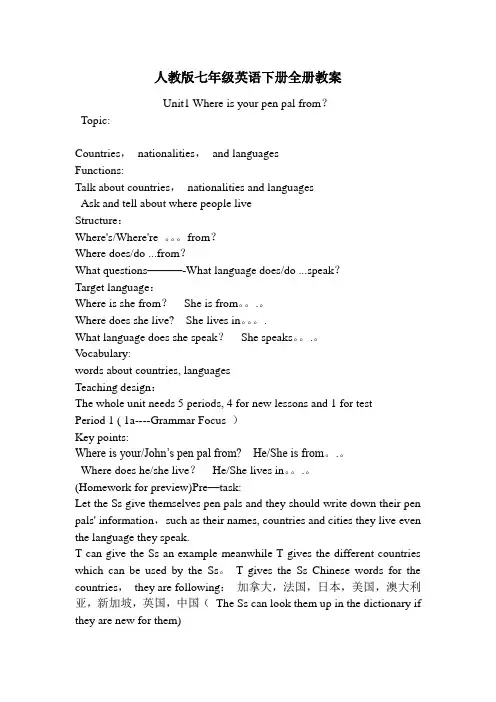
人教版七年级英语下册全册教案Unit1 Where is your pen pal from?Topic:Countries,nationalities,and languagesFunctions:Talk about countries,nationalities and languagesAsk and tell about where people liveStructure:Where's/Where're 。
from?Where does/do ...from?What questions———-What language does/do ...speak?Target language:Where is she from?She is from。
.。
Where does she live? She lives in。
.What language does she speak?She speaks。
.。
V ocabulary:words about countries, languagesTeaching design:The whole unit needs 5 periods, 4 for new lessons and 1 for testPeriod 1 ( 1a----Grammar Focus )Key points:Where is your/John’s pen pal from? He/She is from。
.。
Where does he/she live?He/She lives in。
.。
(Homework for preview)Pre—task:Let the Ss give themselves pen pals and they should write down their pen pals' information,such as their names, countries and cities they live even the language they speak.T can give the Ss an example meanwhile T gives the different countries which can be used by the Ss。
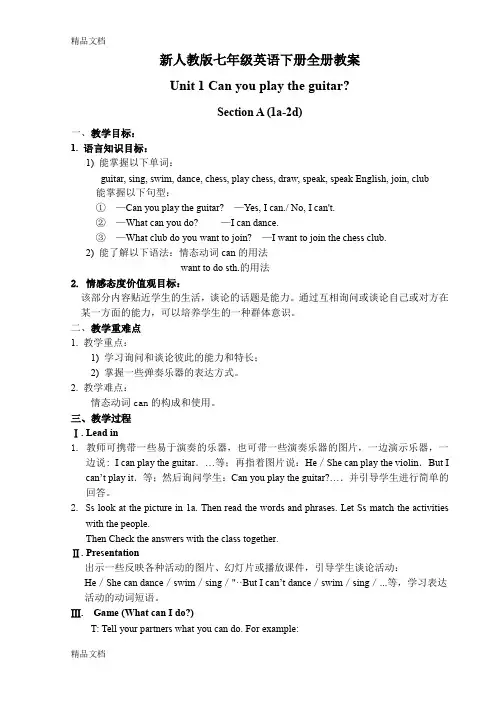
新人教版七年级英语下册全册教案Unit 1 Can you play the guitar?Section A (1a-2d)一、教学目标:1. 语言知识目标:1) 能掌握以下单词:guitar, sing, swim, dance, chess, play chess, draw, speak, speak English, join, club能掌握以下句型:①—Can you play the guitar? —Yes, I can./ No, I can't.②—What can you do? —I can dance.③—What club do you want to join? —I want to join the chess club.2) 能了解以下语法:情态动词can的用法want to do sth.的用法2. 情感态度价值观目标:该部分内容贴近学生的生活,谈论的话题是能力。
通过互相询问或谈论自己或对方在某一方面的能力,可以培养学生的一种群体意识。
二、教学重难点1. 教学重点:1) 学习询问和谈论彼此的能力和特长;2) 掌握一些弹奏乐器的表达方式。
2. 教学难点:情态动词can的构成和使用。
三、教学过程Ⅰ. Lead in1. 教师可携带一些易于演奏的乐器,也可带一些演奏乐器的图片,一边演示乐器,一边说: I can play the guitar.…等;再指着图片说:He/She can play the violin.But I can’t play it.等;然后询问学生:Can you play the guitar?….并引导学生进行简单的回答。
2. S s look at the picture in 1a. Then read the words and phrases. Let Ss match the activitieswith the people.Then Check the answers with the class together.Ⅱ. Presentation出示一些反映各种活动的图片、幻灯片或播放课件,引导学生谈论活动:He/She can dance/swim/sing/"··But I can’t dance/swim/sing/...等,学习表达活动的动词短语。
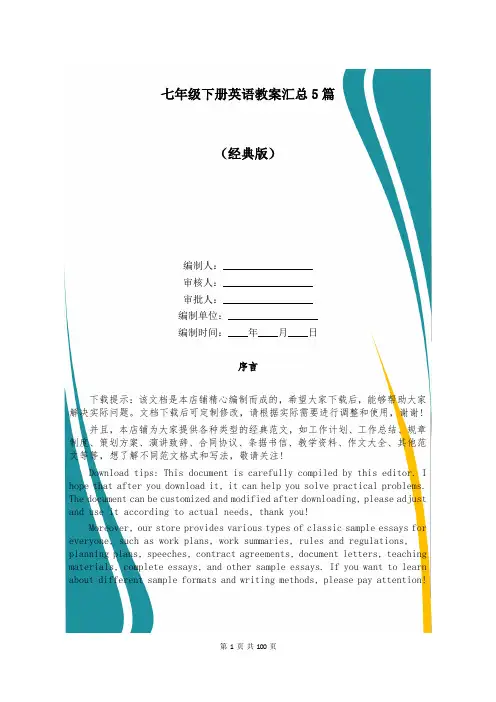
七年级下册英语教案汇总5篇(经典版)编制人:__________________审核人:__________________审批人:__________________编制单位:__________________编制时间:____年____月____日序言下载提示:该文档是本店铺精心编制而成的,希望大家下载后,能够帮助大家解决实际问题。
文档下载后可定制修改,请根据实际需要进行调整和使用,谢谢!并且,本店铺为大家提供各种类型的经典范文,如工作计划、工作总结、规章制度、策划方案、演讲致辞、合同协议、条据书信、教学资料、作文大全、其他范文等等,想了解不同范文格式和写法,敬请关注!Download tips: This document is carefully compiled by this editor. I hope that after you download it, it can help you solve practical problems. The document can be customized and modified after downloading, please adjust and use it according to actual needs, thank you!Moreover, our store provides various types of classic sample essays for everyone, such as work plans, work summaries, rules and regulations, planning plans, speeches, contract agreements, document letters, teaching materials, complete essays, and other sample essays. If you want to learn about different sample formats and writing methods, please pay attention!七年级下册英语教案汇总5篇七年级下册英语教案 1教学目标在本节课结束时,学生将能够了解教室环境中物品的名称并在口语中正确使用My name is… Nice to meet you.等句型简单介绍自己,了解他人的姓名信息,进一步了解新同学;学生将能够了解单元任务的具体要求,并完成自己和小组内成员的姓名部分。
初中七年级下学期的英语教案 初中七年级下学期的英语教案1 一、 重点词汇 1. one hundred and five 表示具体的“几百”时,用“基数词+hundred”表示,注意此时hundred不能加s.
hundreds of表示“数百;成百上千的”,这是hundred后面有s,而且hundreds后面要有介词of,并且不能与数词连用。
与hundred 用法类似的还有单词:thousand,million,billion. Our school is so famous that_____ people come and visit it every term. A. hundred B. hundreds C. hundred of D. hundreds of 2. I ride it to school every day. ride “骑”,后可接bike, horse, motorbike等。 还可以用做可数名词,“旅程”。 an hour’s ride 乘车一个小时的路程 every “每个;每一”,其后接单数可数名词。every day “每天” every day 表示某事发生的频率,“每天,天天”。 I go to school every day. everyday 形容词,“日常的,普通的”。 I study everyday English every day. 3. live live 不及物动词,“居住,生活”,其后若跟名词则必须在名词前加上适当的介词。
I like to live in the country. live on sth. “以某物为食” Sheep live on grass. live a ...life “过....生活” The old man lives a happy life. 4. bus stop bus stop与bus station 都是指“公共汽车站”。 bus stop 指城镇内外的停车点,bus station指能停、转车辆的汽车站点。 stop 做动词,意为“停止”,常用结构: stop to do sth. “停下来去做某事” stop doing sth. “停止做某事”(停止正在做的) Let’s stop to have a rest. Stop talking, please. 5. Crossing the River to School cross是动词,“穿越,越过”,主要指“横穿”。 还可以作名词,意为“十字形,叉形符号”。 across既可以作介词,也可以作副词。 crossing 是名词,“渡口,交叉点”。 6. For many students,it is easy to get to school. It is +adj.+to do sth. “做某事是.......” 7. There is a very big river between their school and the village. between ...and... “在....和...之间”,连接两个并列的成分。 between/among (1) between 用于两者之间。 (2) among 用于三个或三个以上的人或物的“中间”。 8. But he is not afraid. afraid: “害怕的,畏惧的”。 (1)be afraid of sth. 害怕某事/某物 (2)be afraid to do sth. 害怕做某事 (3)be afraid of doing sth. 唯恐做某事,指担心或担忧做某事会引起某种后果。
(4)be afraid + that从句,恐怕.... (5)为某件已经发生或可能发生的事表示歉意或者作出否定判断,相当于sorry. 9. Many of the students and villagers never leave the village. leave主要用法归纳如下: 1. 离开; 脱离 The train will leave at six tomorrow morning. 2. 把……留在; 留下 Leave the child at home. 把小孩留在家里。 3. 遗忘; 丢下 I left my notebook in the dormitory. 我把笔记本落在宿舍里了。 4. 使……处于(某种状态),后面常接宾语补足语 Leave the door open. 5. leave for+地点,“动身去某地” He left for the station a few minutes ago. 10.must /have to must多表示主观需要或责任感的驱使有必要或有义务去做某事,多译为“必须”, have to多表示客观存在的环境所限,即客观要求(无奈)而为之,多译为“不得不干某事”。
I must clean the room because there are too dirty. I have to do my homework now. 11. It takes sb some money/time to do sth.花费某人多少时间/钱做某事 Sb pay some money for sth 某人为某物花费多少钱 Sb spend some time/money on sth 某人在做某事或某物上花费时间/钱 Sb spend some time/ money (in)doing sth Sth cost sb some money 某物花费某人多少钱 二、 短语归纳 1.get to school 到校 2.take the subway 乘地铁 3.take the train 坐火车 4.leave for 到……地方去,离开去某地 5.take…to…把……带到…… 6. most students 大多数学生 7. depend on 依赖,决定于 8.from…to…从……到…… 9.think of 想到,想起 10.ride bikes 骑自行车 11.in other parts of the world 在世界的其他地方 12. how far 多远 13.take the train to school 乘火车去上学 14.in places 在一些地方 15.go to school by boat乘船去上学 1 6.on the school bus乘坐校车 17.be different from和……不同 18.worry about 担忧,焦虑,担心 三、语法专项 how 引导的特殊疑问句 1.how 引导的特殊疑问句提问交通方式,其答语分三种情况: a. take a/an/the+交通工具(单数) take +a/an/the+表示交通工具的名词,乘……去某地。 He takes the train. b. by+交通工具(单数) c. on/in+限定词+交通工具 by+表示交通工具的单数名词或on/in+ a/an/the/one’s+表示交通工具的单数名词,是介词短语作方式状语。 I get to school by bike. = I get to school on my bike. 3.walk/ride/drive/fly+to+地点名词,步行/骑自行车/开车/坐飞机去某地 表示乘交通工具方式可以互换表达相同的意义: Take the bus to school=go to school by bus=go to school on a bus Drive a car to work=go to work by car=go to work in a car Fly to shanghai=go to shanghai by plane/air=take the/a plane to shanghai=go to shanghai on a/an/the plane.
2. how far 用来提问距离,多远,其答语分为两种: (1)用长度单位表示:It is five kilometers. (2)用时间表示:It’s twenty minutes’ walk. 3.how long 用来提问时间,意为多久回答常用“for+段时”。 ----How long have you learnt English? ----For 3 years. 4.how soon 用来提问做完某事还需要多长时间, 常用于将来时态时, 常用“in+时间段”来回答。
――How soon will you arrive in Beijing? ----In 3 hours. (二)宾语从句 1.在句子中起宾语作用的句子叫宾语从句。宾语从句用陈述语序。 2.宾语从句的连接词: (1)从属连词有that, if, whether。 Nobody knew whether she could pass the exam. I know that she is from America. (2)连接代词有who, whom, whose, what 等 Do you know whose book it is? Could you tell me what your father looks like? (3)连接副词有when, where, why, how等 He didn’t tell me when we could meet again. I don’t know how I can get there. wwW.x kB 1.c Om I’m always very busy (忙的) every day. I usually 1 up early at 6:30 in the morning. But 2 . I’m still sleepy (睡着的) . I put on my clothes, I wash my hands 3 face…Do this! Do that. 4 I have my 5 . I go go school. I usually leave home at 7:00. At school we all study 6 . We study English. Chinese, maths and so on (等等). 7 noon (中午) I get home and have lunch. At 1:30 I go to school again. Sometimes we play 8 football in the afternoon. I go home at 4:30. In the evening I do 9 homework. I go to bed at 10:00 and I go to sleep (入睡) very 10 .